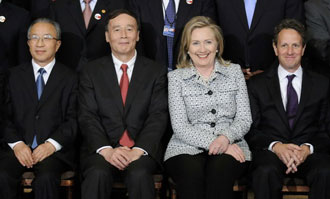The most candid statement to come out of this week’s U.S.-China talks — officially dubbed the Strategic and Economic Dialogue — was the statement by State Councilor Dai Bingguo published in the Wall Street Journal:
China has never thought of vying for a leading position in the world. We have had more than enough of tough days. The only thing we want is that, with our hard work and wisdom, plus the cooperation and exchanges with other countries, we can lift the Chinese people out of poverty.
This statement cuts directly and honestly to the heart of China’s main agenda, and I think most Americans sitting at the table at the various economic and military meetings that took place in Washington the past few days recognize that. In the end Dai’s statement will do more to promote cooperation between the sides than the various cooperation agreements reached during the talks.
Of course, even Dai Bingguo’s statement contains a measure of dissembling. While China’s primary goal is to lift its people out of poverty, it harbors a deep conviction — born of its long unhappy history with the West — that it will once again fall prey to nouvelle forms of colonialism, bullying and exploitation unless it can build a military force that rivals the U.S.‘s. Given its history, it would be foolish for China to believe otherwise. So, in fact, China does have some “thought of vying for a leading position in the world”. But of course to express that sentiment would appear to be rekindling old grudges and has no place coming out of the mouth of a high-level official during a meeting intended to promote trust and cooperation.
The U.S. side hasn’t been completely ingenuous either. We are prodding China to appreciate the yuan by 40% and to embrace democracy as though we really believe that such moves would be beneficial for both nations when we know full well that they would have disastrous consequences for China, the U.S. and the rest of the world.
Having pulled through a Great Recession of our own making in large part due to the global confidence inspired by the rock-solid stability and robust growth of China’s non-democratic state-controlled economy, we Americans know better than most how unfortunately things might have turned out had China too been a wholehearted participant in the form of democratic capitalism that sent the U.S. and western Europe to the brink of another Great Depression. Yet, even as we are emerging from three years of intense pain, we are already pushing China to become just like us, and immediately.
Of course no one sitting at the tables with Tim Geithner, including Geithner himself, really wants such an outcome. Yet our leadership from Obama on down must persist in the charade that we want such radical reforms in China because we are a democracy and our leaders must play to that one-third of Americans who decide elections. That one-third has come to believe that China’s prosperity — and not the natural economic evolution of the world — is the cause of their economic insecurity. To appear in sympathy with those working-class Americans, our entire leadership feels compelled to prod China to take unreasonable measures, even as they are keeping their tongues firmly in their cheeks to keep from laughing out loud.
I have to say, though, that this time around our side’s rhetoric had been toned down considerably. Maybe it’s in recognition of the fact that we owe China some respect for having been a pillar of stability on which we have leaned so recently. Maybe it’s the common sensical recognition that China really has no choice — given its desperate fight to battle inflation — but to continue letting its yuan appreciate gradually. Or maybe it’s the collective wisdom of Obama’s team that recognizes that China’s leadership has a freer hand to take the necessary steps to move its system toward our model if they don’t seem to be caving in to western presssure.
Some observers have remarked on how little substance is contained in the agreements announced at the conclusion of the Strategic Talks. I am heartened by the degree of civility, common sense and candor that both sides have shown in trying to defuse tensions between the world’s leading powers.

